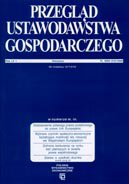Przegląd Ustawodawstwa Gospodarczego nr 06/2012
Rok wydania: 2012
Miejsce wydania: Warszawa
Oprawa: miękka
Przegląd Ustwodawstwa Gospodarczego nr 6/2012
Spis treści
Alojzy Z. Nowak, Uniwersytet Warszawski
Ruth Taplin, Uniwersytet w Laicester
Alternative Scenarios for Overcoming the Eurozone Crisis
Streszczenie
Alternatywne scenariusze przezwyciężenia kryzysu w strefie Euro
Autorzy omawiają kilka możliwych scenariuszy przezwyciężenia aktualnego kryzysu w strefie EURO. Scenariusz pierwszy byłby oparty o bardzo restrykcyjną politykę finansową. Drugi zakłada, że zadłużenie może być zrestrukturyzowane. Trzeci scenariusz przewiduje czerpanie wzoru z rozwiązania zastosowanego w Argentynie, polegającego na dewaluacji waluty i przez to zwiększenia konkurencyjności gospodarki, stymulującej działalność gospodarczą. Czwarte rozwiązanie, zwane „Odrodzeniem Europy” polega na powrocie do myślenia w warunkach solidarności. Propozycja piątego scenariusza polega na otwarciu granic Unii dla państw spoza jej granic.
Analiza zawarta w artykule opiera się o konkretne przykłady rozwiązań z państw Europejskich – krajów bałtyckich, Grecji, ale także Argentyny czy Stanów Zjednoczonych, a także świetnie prosperującej gospodarce Chin.
Następnie została zaprezentowana aktualne kondycja waluty Euro, oceniona przez autorów pozytywnie.
Autorzy przedstawiają także argumenty za tezą, że aktualny kryzys strefy Euro nie spowoduje załamania się tego systemu, a jedynie spowoduje, że będzie on mniej atrakcyjny dla niektórych państw, ubiegających się o przyjęcie tej waluty.
W podsumowaniu artykułu autorzy dochodzą do wniosku, że istotna dla przyszłości strefy Euro będzie także rola opodatkowania, a nawet programu hormonizacji opodatkowania, ustalonego przez wszystkie kraje członkowskie, tak aby aktualna forma kryzysu nie zagrażała w przyszłości unii monetarnej.
Rafał Adamus, Uniwersytet Opolski
Reprezentacja spółki kapitałowej w upadłości wobec członka jej zarządu
Summary
Representation of capital company in bankruptcy toward its’ management board member
The Code of Commercial Partnerships and Companies in art. 210 § 1 and 379 § 1 stipulates that in a contract between the company and a management board member, likewise in a dispute with a management board member, the company should be represented by the supervisory board or by an attorney appointed under a resolution of shareholder’s meeting. The declaration of bankruptcy of the company shall not affect the company bodies. The management board, the supervisory board and the general meeting still exist in the company under bankruptcy proceedings. If bankruptcy by liquidation of the bankrupt’s assets has been declared, the company shall lose the right to administer and the possibility to use and dispose of the assets included in the bankruptcy estate. In arrangement proceedings the assets included in the bankruptcy estate shall be administered by the bankrupt supervised by the court supervisor unless the court appointed an administrator. Under the provisions of the Bankruptcy and Reorganization Law a trustee, administrator or court supervisor take over competences of the company bodies in property affairs. In case of bankruptcy of a company in a contract between the company and a management board member, the company should be represented by a trustee or an administrator.
Barbara Bajor, Instytut Nauk Prawnych PAN
Odpowiedzialność cywilnoprawna płatnika i dostawcy usług płatniczych za transakcje płatnicze (dokonane z wykorzystaniem elektronicznych instrumentów płatniczych) - w ujęciu ustawy o usługach płatniczych
Summary
Civil liability of the payer and payment service provider for payment transactions (in particular made with the use of electronic payment instrument) - in terms of the Act on payment services.
The Act on payment services adopted in August 19th 2011, defines the terms and conditions of the payment services and the rights and obligations of the parties to a contract for payment services (the payer and the payment service provider). An essential issue which is regulated by the Act is the responsibility of the payer and the payment service provider for the transactions made in name and on behalf of the payer. The problem of civil liability should be recognized in two respects. First, the Act contains the rules of financial responsibility in case of the transaction not authorized by the payer, namely those which the payer did not agree and which burdens his bill. Second, the Act provides rules of responsibility of payment service provider for non-performance or improper performance of payment transactions. In any case, if the payer challenges the transaction, it must be determined, who and on which basis, will bear civil and financial liability.
Prawo własności intelektualnej
Maria Obara, Uniwersytet Warszawski
Adam Kapała, Szkoła Główna Handlowa
Roszczenie informacyjne z art.105 ust.2 ustawy o prawie autorskim i prawach pokrewnych, a tajemnica przedsiębiorstwa
Summary
Informative claim from art. 105 passage 2 of an Act on Copyrights and related and business secret
Article presents legal aspects in area of conflict between right to information given to organizations representing interests of artists and law framing trade secrets protection in the light of polish and international legal regulations.
Analysis is performed on sections constituting such organizations, namely s. 105 ss. 1, s. 104, s. 105, s. 106 in their systematic relation to norms embodied in s. 105 ss. 2, s.80, s. 47 and s. 20 of Polish Copyright Law. Questions raised concern independence of right to information (s. 105 ss. 2) from other rights and obligations imposed on such organizations by Polish law.
Analysis touches conflict of material right to exploit trade secrecy only by entitled persons with obligation imposed upon them by s. 20 of Copyright Law.
It is disputed if and how regulations concerning freedom to undertake economic activity and right to have, protect and use trade secrets as Polish and international law frames them can be helpful to interpret right to information (s. 105 ss. 2).
In conclusions authors present their view of the boundaries of right to information, based on performed analysis.
Wydarzenia
Bartosz Jagura, Europejski Uniwersytet Viadrina
Prawo antymonopolowe oraz compliance w przedsiębiorstwie. Refleksje po 2. Polsko-Niemieckim Forum Prawa Gospodarczego, Warszawa listopad 2011 r.
| Inpost Paczkomaty | 14 zł |
| Kurier Inpost | 14 zł |
| Kurier FedEX | 14 zł |
| Odbiór osobisty | 0 zł |
| Darmowa dostawa | od 250 zł |
| Darmowa dostawa w Klubie Książki | od 200 zł |

